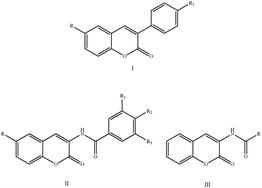3-Substituted coumarins as dual inhibitors of AChE and MAO for the treatment of Alzheimer's disease
Abstract
The complex etiology of Alzheimer's disease (AD) has encouraged active research in the development of multi-target

* Corresponding authors
a
Departamento de Farmacología, Facultad de Farmacia, Universidad de Santiago de Compostela, Santiago de Compostela, Spain
E-mail:
mdoloresvina@usc.es
Fax: +34 98159 4595
Tel: +34 9815 63100
b
Departamento de Química Orgánica, Facultad de Farmacia, Universidad de Santiago de Compostela, Santiago de Compostela, Spain
E-mail:
mariajoao.correiapinto@rai.usc.es
Fax: +34 981 544912
Tel: +34 981 563100
The complex etiology of Alzheimer's disease (AD) has encouraged active research in the development of multi-target

 Please wait while we load your content...
Something went wrong. Try again?
Please wait while we load your content...
Something went wrong. Try again?
D. Viña, M. J. Matos, M. Yáñez, L. Santana and E. Uriarte, Med. Chem. Commun., 2012, 3, 213 DOI: 10.1039/C1MD00221J
To request permission to reproduce material from this article, please go to the Copyright Clearance Center request page.
If you are an author contributing to an RSC publication, you do not need to request permission provided correct acknowledgement is given.
If you are the author of this article, you do not need to request permission to reproduce figures and diagrams provided correct acknowledgement is given. If you want to reproduce the whole article in a third-party publication (excluding your thesis/dissertation for which permission is not required) please go to the Copyright Clearance Center request page.
Read more about how to correctly acknowledge RSC content.
 Fetching data from CrossRef.
Fetching data from CrossRef.
This may take some time to load.
Loading related content
